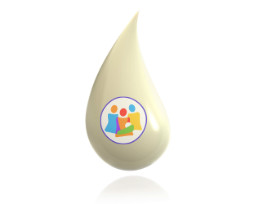Vitamin D for the Human Milk-Fed Baby
Updated 01/25
PDF Version
- • All babies need vitamin D supplementation since vitamin D naturally comes from exposure to direct sunlight. The amount of sunlight needed to support an optimal vitamin D level in infants is not advised due to the risk of sunburn and the increased risk of skin cancer over time. Vitamin D is essential to avoid a bone disease called rickets. Vitamin D also plays a role in supporting a strong healthy immune system.
- • The amount of vitamin D in breastmilk depends on mom’s vitamin D level. Most lactating women don’t have sufficient levels of vitamin D in their breastmilk, unless they are taking a high dose vitamin D supplement.
- • The human-milk fed baby should be given 400 international units (IU) of a vitamin D3 supplement until at least 1 year of age. This can be given directly to your baby or can be placed in a bottle of expressed milk. When shopping for vitamin D3, look for products that are specifically labelled for infants. Follow the directions on the label for dosing, as infant supplements vary. While they all provide 400 units per dose, some infant vitamin D3 supplements are designed to deliver 400 units in just 1 tasteless drop, while others require 1 ml in a less-than-ideal tasting suspension.
- • Studies have shown that lactating women who take 6400 units of vitamin D3 often have sufficient vitamin D in their breastmilk. However, there are no approved professional protocols at this time. Because the ideal maternal dose may vary depending on mom’s health status and her weight, it is still recommended to supplement the infant directly with 400 units each day.
- • If the baby is weaned before a year of age, the vitamin D supplement can be discontinued once the baby is no longer breastfeeding and is just taking formula. Formula has vitamin D in it.
- • After your child is 1 year of age, talk to your doctor about whether to continue the vitamin D supplement. Dairy products are fortified with vitamin D and are the main source of vitamin D in food after 1 year of age. If your toddler does not eat dairy products, it would be prudent to continue 400 units of vitamin D each day. However, for toddlers who do eat dairy, continuing a 400 unit vitamin D3 supplement is reasonable and safe.


